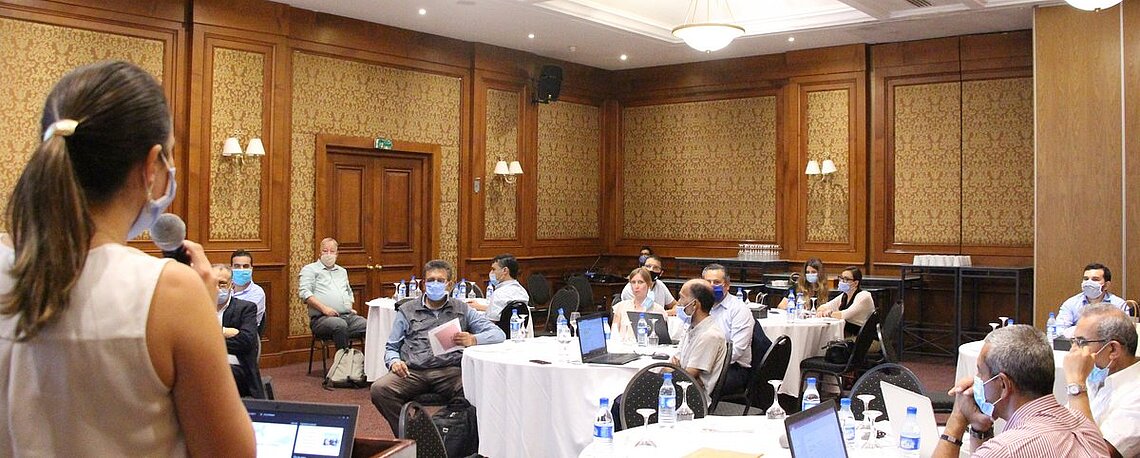Hintergrund und Zielsetzung
Tunesien ist das einzige arabische Land mit einer parlamentarischen Demokratie sowie einer modernen Verfassung, und daher ein wichtiges Partnerland für die deutsche Regierung - auch im Hinblick auf die Bekämpfung des Klimawandels. Die Bevölkerung Tunesiens ist stark vom Klimawandel betroffen, insbesondere in den ländlichen Regionen. In dem tunesischem Klimaschutzbeitrag hat sich die tunesische Regierung ambitionierten Emissionsreduktionszielen verschrieben. Die Zementindustrie ist für einen Großteil der tunesischen Treibhausgasemissionen verantwortlich, weswegen ein Schwerpunkt der Projektaktivitäten auf dem Zementsektor liegt. Ein weiteres Ziel ist der Aufbau von Kapazitäten zu neuen Marktmechanismen unter Artikel 6 des Pariser Abkommens. Diese sollen zudem vermehrt in politische Prozesse wie dem NDC Update oder der Entwicklung einer Langfriststrategie miteingebracht werden.
Umsetzung
Zu den Schlüsselsektoren für marktbasierte Klimaschutzinstrumente in Tunesien gehören die Industrie (insbesondere Zement und Salpetersäure) sowie die Energiewirtschaft. Der Abbau regulatorischer Hindernisse ist hierbei ein wichtiger Schritt. Das Projekt unterstützt den Aufbau eines funktionierenden Monitoring-, Berichterstattung- und Verifizierungssystems (MRV) - eine wichtige Voraussetzung für marktbasierte Klimaschutzinstrumente. Zudem werden innovative Technologien (Low-Clinker und Co-Processing) pilotiert, die den Prozess der Zementproduktion nachhaltiger gestalten. Das Projekt bietet zudem Trainings im Bereich Kohlenstoffmärkte und Klimafinanzierung für eine Reihe verschiedener öffentlicher Stakeholder an , z.B. dem Umweltministerium, der Energieagentur (ANME) aber auch dem Privatsektor.
Auch die Entwicklung neuer Ansätze und Instrumente im Bereich der globalen Kohlenstoffmärkte wird unterstützt. So versucht das Projekt beispielsweise, das tunesische Minderungsportfolio (Bedarfe und Investitionsmöglichkeiten) mit den verfügbaren Finanzierungsressourcen für marktbasierte Instrumente oder Ergebnisbasierter Zahlungen (results-based finance) zusammenzuführen. Durch Studien wird das Potential für die Nutzung unter Artikel 6 oder dem freiwilligen Kohlenstoffmarkt geprüft.
Meilensteine und Ausblick
Durch diverse Trainings hat das Projekt Globaler Kohlenstoffmarkt die Kompetenzen von Akteurinnen und Akteuren des öffentlichen und privaten Sektors im Bereich der Marktmechanismen gestärkt. Es hat die Regierung dabei unterstützt, Artikel 6 zu einer Priorität zu machen und sich durch regionalen Dialog aktiv an den Verhandlungen auf internationaler Ebene einzubringen. Tunesien bereitet sich auf eine aktive Teilhabe am globalen Kohlenstoffmarkt vor. Mithilfe des Projekts konnte ein zentrales Monitoring, Reporting und Verification (MRV)-System im Zementsektor eingerichtet werden. Dadurch soll die Zementwirtschaft auf eine mögliche Integration in die Kohlenstoffmarktmechanismen nach 2020 vorbereitet werden.

